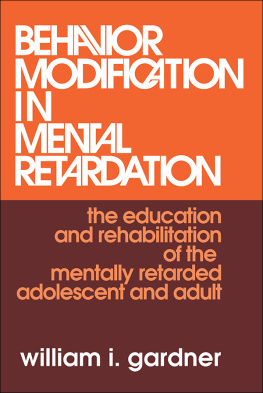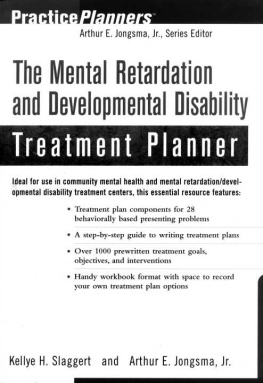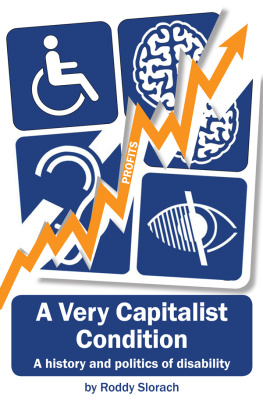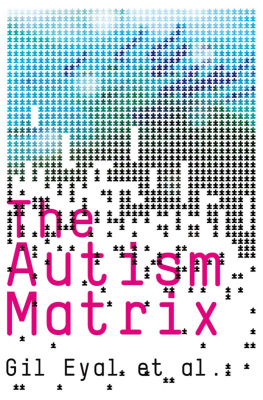First published 1967 by Transaction Publishers
Published 2017 by Routledge
2 Park Square, Milton Park, Abingdon, Oxon OX14 4RN
711 Third Avenue, New York, NY 10017, USA
Routledge is an imprint of the Taylor & Francis Group, an informa business
Copyright 1967 by Taylor & Francis.
All rights reserved. No part of this book may be reprinted or reproduced or utilised in any form or by any electronic, mechanical, or other means, now known or hereafter invented, including photocopying and recording, or in any information storage or retrieval system, without permission in writing from the publishers.
Notice:
Product or corporate names may be trademarks or registered trademarks, and are used only for identification and explanation without intent to infringe.
Library of Congress Catalog Number: 2009013770
Library of Congress Cataloging-in-Publication Data
Baumeister, Alfred A.
Ameliorating mental disability : questioning retardation / Alfred A. Baumeister.
p. cm.
Previous ed. has title: Mental retardation.
Includes bibliographical references and index.
ISBN 978-0-202-36265-6 (alk. paper)
1. Mental retardation. I. Baumeister, Alfred A. Mental retardation. II. Title.
RC570.B3 2009
362.2dc22
2009013770
ISBN 13: 978-0-202-36265-6 (pbk)
Preface
D IAGNOSIS of mental retardation has often been confused with prognostic implications. Many people, both professionals and laymen, still believe that it is impossible to produce significant changes in the behavior of the retarded. Many still assume that a diagnosis of retardation invariably implies a prognosis of no improvement, of despair. Thus, when distinct and desirable changes occur in the behavior of a retarded person, it is often concluded that the diagnosis was wrong, that the person was not really retarded in the first place.
This viewpoint, although still prevalent, has been seriously questioned. A renewed and reasoned optimism, founded on scientific and political progress, seems to be emerging. Significant advances have been made in our understanding of the behavioral and biological correlates of mental retardation. In addition to these dramatic accomplishments, basic data are rapidly accumulating showing that appropriate adaptive behaviors can be shaped in retarded individuals, including those heretofore regarded as subtrainable. The increasingly widespread public concern for the social and economic consequences of retardation is reflected in the substantial government appropriations that sup-port research and service activities.
This book grows out of the optimistic view that mental retardation can be treated. It views treatment broadly. While the concept of treatment is usually interpreted in a strictly medical sense, this book is based upon the premise that mental retardation is primarily a behavior problem. It recognizes a child is not diagnosed as retarded simply because he has, say, a chromosomal anomaly, but rather because he behaves in certain maladaptive ways. We view any intervention that is intended to produce adaptive changes in the behavior of the retarded as treatment. While the emphasis of this book is on behavior, the book is not a psychology text. Its authors come from the fields of medicine, special education, and speech and hearing, as well as from psychology.
The purpose of this book is to help students and workers in the field apply research findings and theoretical formulations to the appraisal and treatment of mental retardation. The primary emphasis of the book is empirical. Discussion of diagnosis and treatment has been couched too frequently in authoritarian terms that have never been put to empirical tests. While many of the suggestions made in this book have not been subjected to rigorous ex-perimental scrutiny, almost all have been de-rived from a close examination of the research literature. Our view is that such empirically based hypotheses are superior to unbolstered assertions of authorities.
In preparing this book, we have assumed the reader already has a general acquaintance with the field of mental retardation. Our goal has been to identify and deal with several critical problem areas in a way that will be helpful to those who work with the retarded. Frankly, our interest is in ameliorating the condition of the mental retardate. This book will not likely excite the purist. We have forgone extensive, critical reviews of the literature and emphasized the practical implications of research. We have tried to offer the student an optimistic glimpse of a field in which a technology is rapidly developing from researcha field he may enter convinced that he will be more than a passive observer and custodian of natures errors. Finally, we have suggested to the researcher some gaps in the current status of information in this field.
A wide diversity of topics has been included in this volume. Two criteria were followed for including a particular topic: (a) the relevance of the topic to the understanding and modification of defective behavior: (b) the subjects popularity or neglect in other sources. Some chapters are considerably longer because more data are available in some areas, some topics are more general, and authors whose subjects had not been recently or adequately reviewed elsewhere were encouraged to develop them fully.
Alfred A. Baumeister












